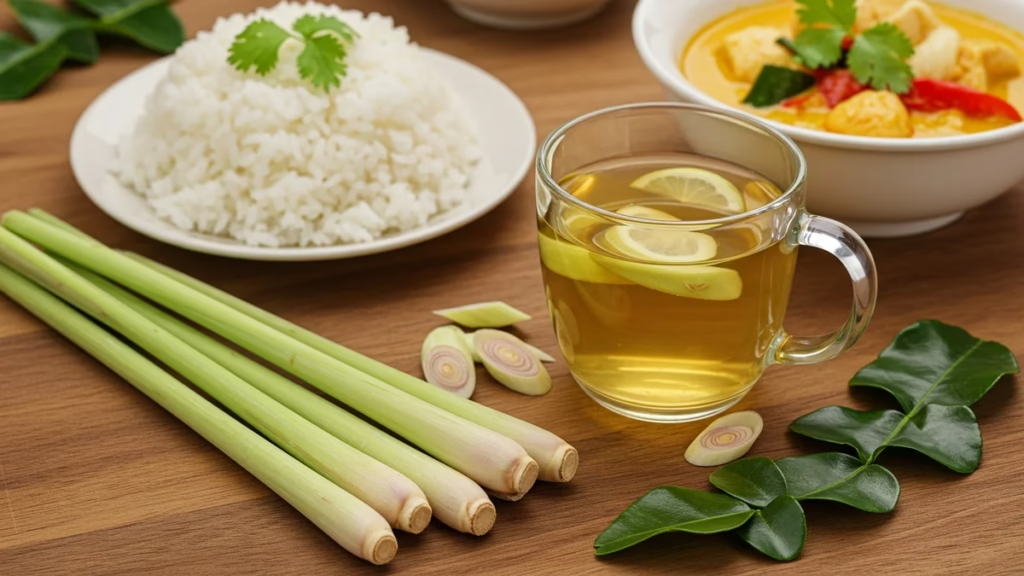Lemon grass is more than just a fragrant herb—it’s a global favorite in kitchens, wellness routines, and gardens. People use it in teas, soups, essential oils, and even in lemon grass restaurants that specialize in Southeast Asian cuisine. But beyond its flavor and aroma, the Cymbopogon citratus plant offers impressive health benefits that are backed by both tradition and modern research.
In this article, we’ll explore its nutritional value, wellness uses, culinary role, growing tips, and why it has become an essential herb worldwide.
What is Lemon Grass?
Lemon grass (Cymbopogon citratus) is a tall perennial grass native to Asia and Africa. It has long green stalks that release a strong lemon-like aroma when crushed. This unique scent makes it a popular ingredient in food, beverages, and natural remedies.
Unlike some herbs that are only culinary or medicinal, Cymbopogon citratus combines both worlds. That’s why you’ll find it in herbal teas, skincare products, and flavorful curries.
Nutrition in Lemon Grass
A simple stalk of Cymbopogon citratus holds a surprising range of nutrients. Here’s a quick overview per 100 grams:
| Nutrient | Amount | Health Role |
|---|---|---|
| Calories | 99 kcal | Low-calorie herb |
| Vitamin C | 2.6 mg | Supports immunity |
| Vitamin A | 6 mcg | Improves skin and vision |
| Folate | 75 mcg | Aids cell growth |
| Potassium | 723 mg | Balances blood pressure |
| Magnesium | 60 mg | Relieves muscle tension |
This nutrient profile explains why so many people are turning to lemon grass benefits as part of their daily diet.
Top Lemon Grass Benefits
The benefits of Cymbopogon citratus extend from digestion to mental health. Let’s look at the highlights:
1. Improves Digestion
A warm cup of Cymbopogon citratus tea can soothe bloating, indigestion, and stomach cramps. Its antibacterial qualities also keep the gut healthy.
2. Strengthens Immunity
Rich in antioxidants and Vitamin C, lemon grass helps the body fight infections and recover faster.
3. Supports Weight Management
People who include Cymbopogon citratus tea in their routine often notice improved metabolism and lower cholesterol levels.
4. Reduces Stress
The refreshing aroma of the lemon grass plant has a calming effect. That’s why spas and aromatherapists often use it in oils and diffusers.
5. Natural Detox
Acting as a diuretic, Cymbopogon citratus helps flush out excess fluid and toxins, promoting kidney health.
6. Promotes Skin and Hair Care
Lemon grass oil has antifungal and antibacterial properties, which makes it useful against acne, dandruff, and skin irritation.
Lemon Grass in Cooking
The global rise of lemon grass restaurants proves its value in cuisine. Its flavor blends citrus freshness with mild spiciness, making it versatile in both savory and sweet dishes.
Common Uses:
- Soups & Stews: Essential in Thai Tom Yum soup.
- Curries: Used in green curry paste for rich flavor.
- Teas & Infusions: Popular as a refreshing herbal drink.
- Desserts: Adds subtle fragrance to puddings and cakes.
Transitioning from the kitchen to the dining table, Cymbopogon citratus continues to impress with its adaptability.
Growing the Lemon Grass Plant
Good news—anyone can grow a lemon grass plant at home with a little care.
Steps to Grow:
- Select Fresh Stalks: Choose firm, green stalks.
- Rooting: Place the stalks in water until roots form.
- Planting: Move them into soil with good drainage.
- Sunlight & Water: Keep in full sun and water consistently.
- Harvesting: Cut stalks at the base when thick enough.
Growing it at home not only saves money but also ensures a steady supply of fresh herbs.
Cymbopogon Citratus in Traditional Medicine
Traditional systems like Ayurveda and Chinese medicine have valued Cymbopogon citratus benefits for centuries.
- Ayurveda: Known as “fever grass,” used to treat fever and cough.
- Chinese Medicine: Applied for digestive and circulatory health.
- Folk Remedies: Popular for relieving headaches, joint pain, and infections.
Even today, many cultures brew lemon grass tea as a household remedy.
Lemon Grass Essential Oil
Beyond the plant, its essential oil has gained popularity.
- Aromatherapy: Reduces anxiety and promotes relaxation.
- Massage Oil: Relieves sore muscles and stiffness.
- Skin Care: Used in lotions and soaps for freshness.
- Natural Repellent: Keeps away mosquitoes and pests.
With so many uses, the essential oil extends the herb’s benefits beyond the kitchen.
Why People Love Lemon Grass Restaurants
The trend of lemon grass restaurants continues to grow globally. Here’s why:
- Cymbopogon citratus pairs well with spicy and rich foods.
- It improves digestion while enhancing taste.
- Diners looking for healthier meals enjoy its natural benefits.
- It offers an authentic touch of Asian cuisine.
Trying dishes at a Cymbopogon citratus restaurant is one of the best ways to experience this herb’s culinary magic.
Side Effects and Precautions
Although Cymbopogon citratus benefits are numerous, it’s important to use it in moderation.
- Too much may lead to dizziness or frequent urination.
- Pregnant people should avoid large amounts.
- Those allergic to grasses should consult a doctor before use.
FAQs
Q1. Can Cymbopogon citratus help with sleep?
Yes, its calming effect may improve relaxation and sleep quality.
Q2. Is lemon grass the same as citronella?
No. Citronella is mainly used as a repellent, while Cymbopogon citratus is safe for food and drinks.
Q3. Can I grow lemon grass indoors?
Yes, it grows well in pots with sufficient light and water.
Conclusion
Cymbopogon citratus is more than a kitchen ingredient—it’s a wellness companion, a garden-friendly plant, and a restaurant favorite. Whether you sip it as tea, cook with it, or enjoy its aroma in essential oils, its benefits are too good to ignore.
Next time you search for a lemon grass restaurant or consider planting herbs at home, remember that this simple grass can enrich both your plate and your health.







